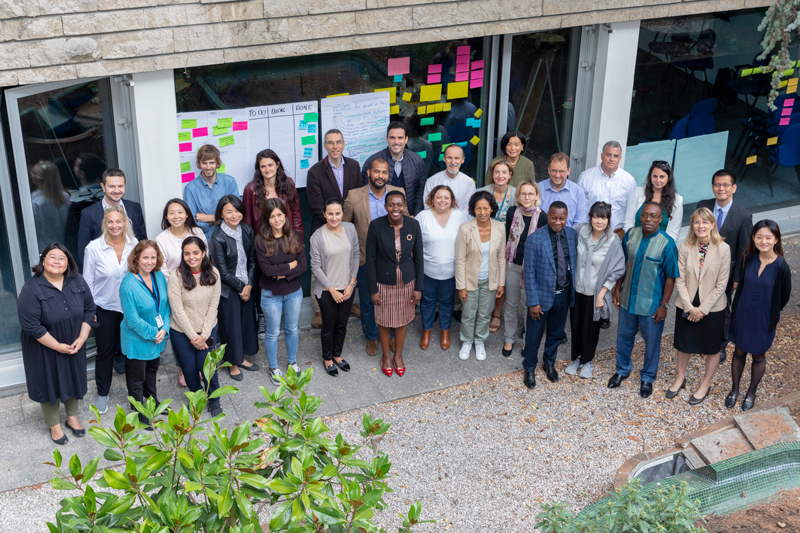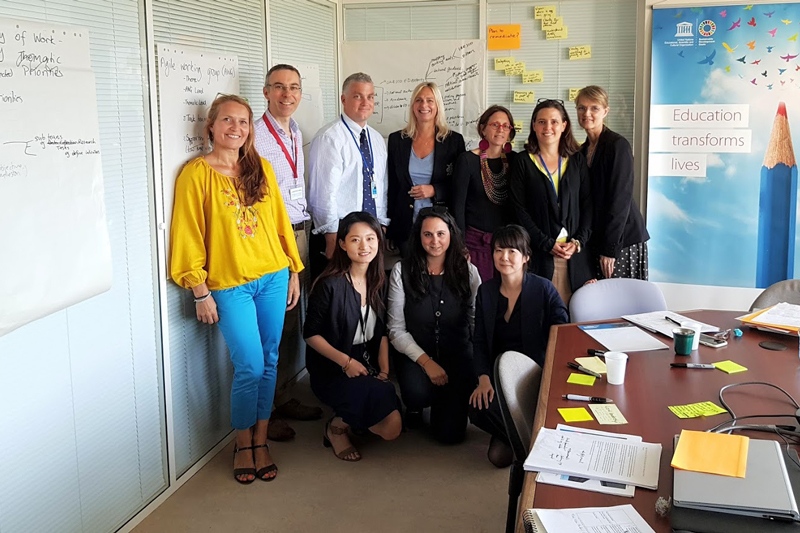Agile working group on Futures of Education. From left to right Ms Maya Prince (Education Research and Foresight, Education Sector), Ms Svetlana Knyazeva (UNESCO Institute for Information Technologies in Education, Moscow), Mr Mame Omar Diop (UNESCO Office New Delhi), Mr Olivier Pieume (UNESCO Office Dakar).
*****
“Massive enthusiasm, massive energy,” is how trainer Steven Mackenzie described the working and training sessions on how to apply an agile methodology at UNESCO.
The Education Sector organized, in September 2019, training for three working groups on girls’ and women’s education, futures of education and education for migrants, refugees and internally displaced people. Mackenzie trained over fifty participants from HQs, field offices and Category I Institutes in this pilot project in the framework of UNESCO’s Strategic Transformation.
Previous smaller experiments in the Education Sector showed that teams had not yet fully found relevance to their work in generic agile training, and so Katja Konkola, the Head of Human Resources in the Education Sector, and her colleagues worked with Mackenzie via QA Training to build a better and more relevant training experience. The workshops were based around planning and delivery of work by each working group. The time spent on prescriptive process rules was minimized, and the groups started with an immersive experience using techniques for inclusive collaboration that they can apply directly in their on-going work. “We have seen agile working in place now, these are experienced agilists doing visionary thinking,” was his proud description of the achievements of the participants during the training weeks.

Agile working group on Girls’ and Women’s education
Focus on the highest priorities, deliver faster
Kyungah Bang, Project Officer in Bangkok office participated in the training. She believes that by using agile method, the Organization can create a culture of cooperation between different teams and sectors to address complex global issues.
“I think the biggest advantage of being agile is being flexible and collaborative to create better synergy,” Kyungah Bang said.
“We often work in silos, which lead to fragmented approaches. Being agile you can react faster and look at the issue in a more comprehensive way by bringing different expertise,” she says. Bang already uses agile methods and tools in her daily work.
There are also challenges that need to be addressed in a systemic manner. Steven Mackenzie describes how several of the training participants spoke about the burden on them from multiple simultaneous priorities.
“This leads to long queues of work for people and the queues introduce unnecessary delays and other problems in project implementation: individuals who treat different projects with different priority will not respond quickly to each other, leading to lost momentum. For individuals it is often stressful and inefficient to be constantly switching between on-going projects. Agile working brings together colleagues with different expertise to align with a shared priority, and to collaborate as closely as possible. This makes it possible to deliver work more quickly just by eliminating much of the time spent waiting for each other,” Mackenzie explains.
He calls UNESCO’s managers to consider having a smaller number of parallel activities in progress at the same time.
“If you limit the number of tasks that are in progress at the same time you will complete more work more quickly. At the moment, the different tasks that are in progress delay each other, and when more work is started that makes the situation worse. Instead, only when we finish one task should we start a new one. Stop starting and start finishing,” he explains.
“Related to this is that a task should not be considered finished while it is waiting for review or approval. UNESCO processes incorporate a lot of review and approval. Finding a way to delegate more approval authority in to - or at least closer to - the teams that do the work would be another immediate way to speed up delivery of all of your work.”
“It is a fact of working life that we will always have different streams of work to push forwards. Agile working at UNESCO can support that with the help of the leadership in maintaining a focused set of active priorities. This is just one example of the active role in driving helpful change in the policies and culture of the organization that will need leadership engagement.”

Agile working groups on Futures of Education and Education for migrants, refugees and internally displaced persons
Relevant, visible and impactful
Another trainee, Victoria Kisaakye, Senior Project coordinator from The International Institute for Capacity Building in Africa (IICBA), calls for better coordination. She believes that using agile methodology requires strengthening coordination and coherence by the top leadership of the institution with deliberate efforts to strengthen the capacity of staff to adapt as well as improve coordination among the different units and section towards achieving the overarching goals of UNESCO.
”Joint-planning, review and coordination meetings for all units and sectors, monthly cross sectoral meetings for information sharing for all staff, deliberate efforts for different sectors to develop and implement joint-programs and constant reminders about the UNESCO’s overarching goals”, Victoria Kisaakye lists as examples how to become agile.
In addition to a more rapid response through better focus and closer alignment of work, agile working helps organizations deliver programmes with increased relevance to the world, more visible to donors and with more impact to beneficiaries.
Mackenzie explained “This is because agile working requires us to plan delivery as a sequence of incrementally more valuable outcomes, instead of making a single delivery after a longer time. These smaller steps forward are important opportunities to test our work in the changing world, and by adapting our further plans from what we discover we maximise the outcome from our effort. This ‘incremental planning’ and frequent validation is another place where leadership will need to both support and challenge their teams.”
“Fundamentally changing culture in an organization is the largest challenge”, says Makenzie. He believes that UNESCO can overcome the challenges. “The energy in this room over the last week has convinced me, but the job will require the energy and support of people through all levels in the organisation.”
The learning and coaching process with agile methodologies will continue. Katja Konkola confirmed that coaching sessions would continue to review the outcomes, challenges and obstacles, and broaden the participation and involvement of leadership.

Agile thematic leaders, working group leaders and sub-group leaders.
